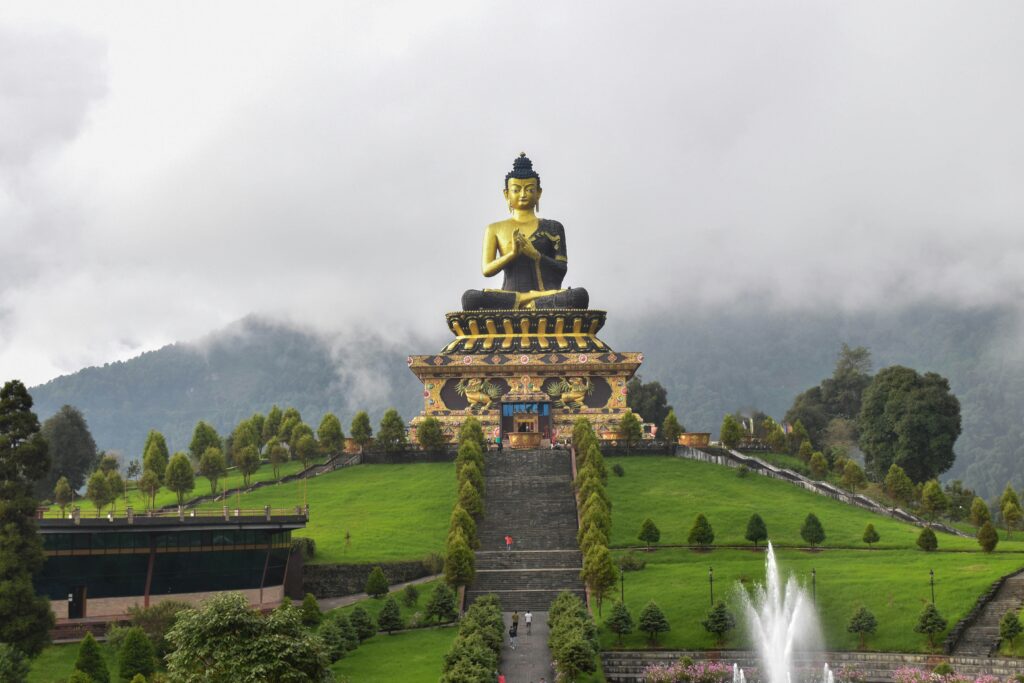Tucked away in the northern reaches of Sikkim, Lachen is a high-altitude village that feels like a secret whispered by the Himalayas. With its wooden homes, snow-kissed peaks, and spiritual calm, Lachen is more than just a stopover—it’s a soulful destination. The popular tourist attractions in Lachen offer a rare blend of untouched nature, cultural depth, and alpine adventure. Whether you’re chasing glaciers, meditating in monasteries, or photographing surreal landscapes, Lachen invites you to slow down and breathe in the magic.
Why Lachen Is a Must-Visit
Lachen, meaning “big pass” in the Bhutia language, sits at an altitude of 2,750 meters and serves as the gateway to North Sikkim’s most iconic destinations. It’s the starting point for journeys to Gurudongmar Lake, Chopta Valley, and the remote Lhonak Valley. But Lachen itself is a treasure—quiet, authentic, and surrounded by Himalayan grandeur.
Highlights
- Gateway to Gurudongmar Lake and Kanchenjunga National Park
- Rich Bhutia culture and traditional wooden architecture
- Ideal for nature lovers, spiritual seekers, and photographers
- Less commercialized than Gangtok or Lachung—perfect for slow travel
Popular Tourist Attractions in Lachen
Here’s a curated list of Lachen’s most iconic and soul-stirring destinations:
1. Gurudongmar Lake
One of the highest lakes in the world at 5,430 meters, Gurudongmar is the crown jewel of North Sikkim. Revered by Buddhists, Hindus, and Sikhs, the lake remains partially frozen even in summer, reflecting the surrounding peaks in surreal clarity.
- Highlights: Spiritual significance, dramatic landscapes, glacial beauty
- Best Time: April to June
- Travel Tip: Acclimatize properly and carry warm clothing; altitude sickness is common
2. Chopta Valley
Often called the “Valley of Flowers” of North Sikkim, Chopta Valley transforms into a carpet of alpine blooms during summer. At 4,000 meters, it offers panoramic views of Pauhunri and Shundu Tsenpa peaks.
- Activities: Trekking, photography, birdwatching
- Best Time: May to September
- Nearby: Thangu village, a quaint hamlet with traditional Bhutia homes
3. Lachen Monastery (Ngodub Choling)
Built in 1858 and reconstructed in 1977, this serene monastery follows the Nyingmapa sect of Mahayana Buddhism. It’s a peaceful retreat with Tibetan architecture and panoramic views of the valley.
- Highlights: Prayer flags, murals, spiritual ambiance
- Ideal For: Meditation, cultural immersion, sunrise photography
4. Tso Lhamo Lake
Located near the Indo-Tibetan border at 5,330 meters, Tso Lhamo is one of India’s highest and most pristine lakes. It’s less visited than Gurudongmar but equally mesmerizing.
- Highlights: Remote beauty, glacial reflections, solitude
- Permit Required: Restricted access; check with local authorities
5. Lhonak Valley
A remote and untouched valley near the Indo-Tibetan border, Lhonak is a paradise for trekkers and wildlife enthusiasts. It’s part of the Kanchenjunga biosphere and offers surreal views of glaciers and alpine meadows.
- Activities: Trekking, camping, wildlife spotting
- Best Time: October to November for clear skies
6. Kalapatthar
Not to be confused with the Everest viewpoint, Kalapatthar near Lachen offers panoramic views of the Kanchenjunga range. It’s a lesser-known gem ideal for sunrise treks and photography.
- Highlights: Snowfields, dramatic peaks, solitude
- Ideal For: Adventure seekers and landscape photographers
7. Kanchenjunga National Park
A UNESCO World Heritage Site, this park is home to red pandas, snow leopards, and rare Himalayan flora. Lachen serves as a base for treks into the park’s northern zones.
- Activities: Trekking, birdwatching, eco-tourism
- Best Time: March to June and September to November
8. Shingba Rhododendron Sanctuary (En Route to Yumthang)
Though technically closer to Lachung, this sanctuary is often included in extended Lachen itineraries. It blooms with over 40 species of rhododendrons in spring.
- Best Time: April to May
- Ideal For: Nature lovers and botanists
Cultural Experiences in Lachen
Beyond natural beauty, Lachen offers rich cultural immersion:
- Bhutia Homestays: Stay with local families and experience traditional hospitality
- Local Cuisine: Try thukpa, churpi (yak cheese), and fermented bamboo shoots
- Festivals: Attend the annual Cham dance at Lachen Monastery or Losar celebrations
Best Time to Visit Lachen
| Season | Months | Highlights |
| Spring | Mar–Jun | Rhododendron blooms, clear skies, ideal for trekking |
| Monsoon | Jul–Sep | Lush greenery but landslides may occur |
| Autumn | Oct–Nov | Crisp air, golden landscapes, great for photography |
| Winter | Dec–Feb | Snow-covered terrain, limited accessibility |
Suggested 5-Day Lachen Itinerary
Day 1: Arrive in Gangtok → Drive to Lachen → Check-in and acclimatize
Day 2: Visit Lachen Monastery → Explore Kalapatthar → Local village walk
Day 3: Early morning drive to Gurudongmar Lake → Return via Chopta Valley
Day 4: Optional trek to Lhonak Valley or visit Tso Lhamo Lake (if permitted)
Day 5: Return to Gangtok or continue to Lachung/Yumthang
Travel Tips for Lachen
- Permits: Required for Gurudongmar, Tso Lhamo, and border areas—apply via registered tour operators
- Altitude: Acclimatize slowly and stay hydrated; carry Diamox if needed
- Connectivity: Limited mobile network; BSNL and Jio work best
- Packing Essentials: Warm layers, sunscreen, lip balm, trekking shoes
- Local Etiquette: Respect monastery rules and avoid plastic waste
Sustainable and Mindful Travel
Lachen’s fragile ecosystem needs conscious tourism. Travelers are encouraged to:
- Stay in eco-certified homestays or lodges
- Avoid littering and use reusable bottles
- Support local guides and artisans
- Stick to marked trails and avoid disturbing wildlife
Final Thoughts
The popular tourist attractions in Lachen offer more than just scenic beauty—they invite you into a world of Himalayan mystique, spiritual depth, and cultural authenticity. Whether you’re watching prayer flags flutter in the wind, sipping butter tea in a Bhutia home, or standing breathless before Gurudongmar Lake, Lachen leaves you with memories that feel timeless.


